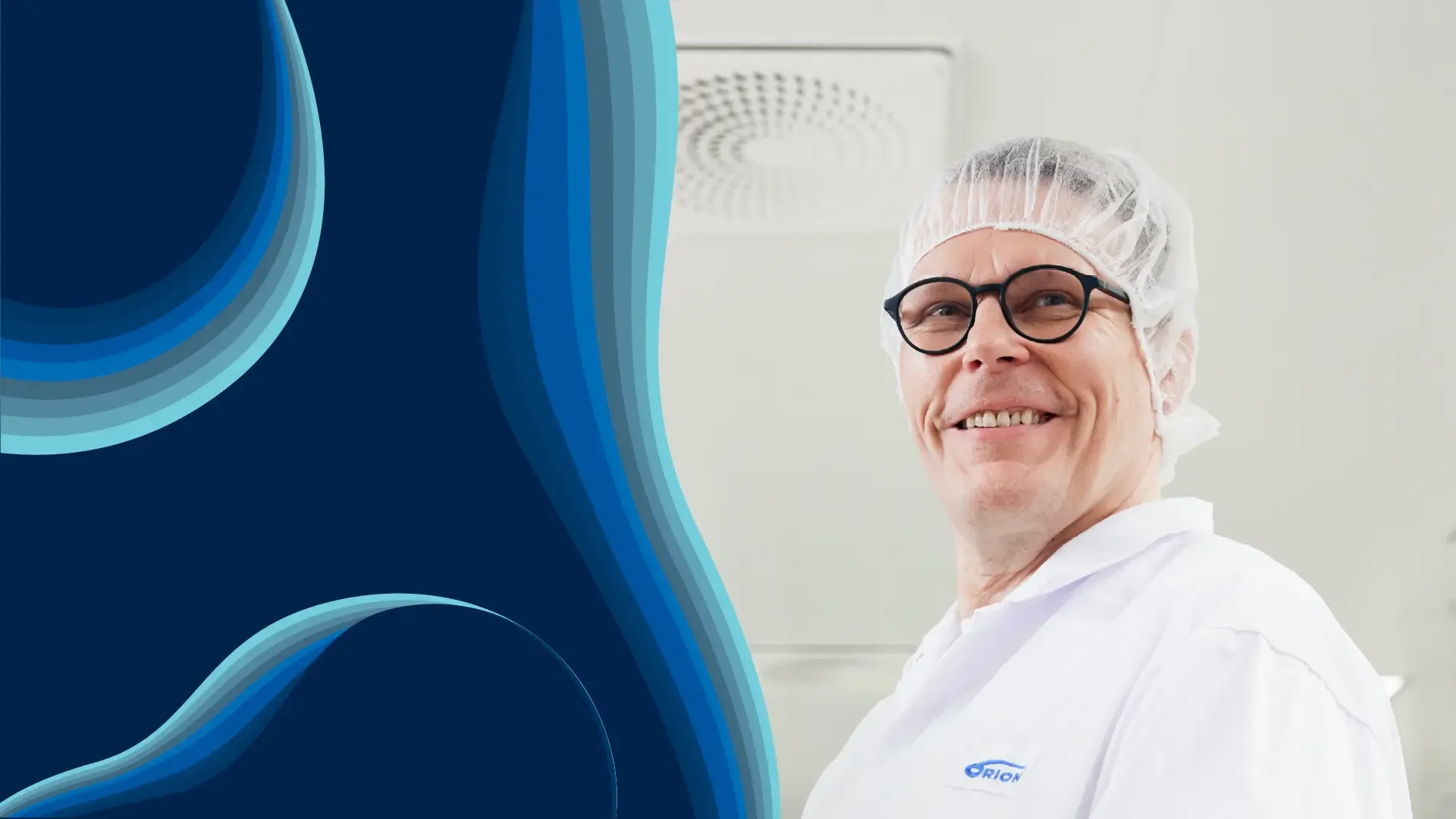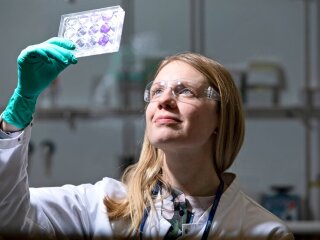What is it really like to be in the middle of a PhD project at the intersection of academia and industry? Veera Bruce and Linh Tong are part of a new generation of scientists whose work bridges academic insight with real-world impact. In this interview, they share how their projects matter not just for chemistry and medicine, but also for their own growth as researchers and individuals.
Veera Bruce
- Department of Chemistry, University of Jyväskylä
- Research at Orion: Boronic acid-catalysed amidation

It has been a pleasure to see how good infrastructure supports efficient and productive research.
Veera, what is your doctoral research about?
My research focuses on troubleshooting chemical reactions with the aim of making them more user-friendly. In other words, I work with method development but instead of discovering new reactions I focus on making the existing – yet challenging ones – more approachable. Since joining Orion, a part of my work has also consisted of automating reaction optimization.
How does this research stand out?
Method development is a crucial part of synthetic chemistry as it provides tools for chemists to use. Since I started my doctoral studies, I have worked with three different chemical reactions trying to find optimal conditions for each and therefore improve their usability. The latest one is by far the most interesting as it is so widely used especially in medicinal chemistry.
Why does your research matter to you personally?
The chemical industry is moving towards a greener and more sustainable direction and therefore we need new methods to replace the old ones that do not meet modern requirements. The reaction that I’m currently working with traditionally relies on chemicals that can cause health problems in cases of long-term exposure. We want to have a safer alternative that works and is user-friendly.
What’s it been like doing doctoral research at Orion?
I have truly enjoyed my time at Orion. The working environment has been inspiring, and it has been a privilege to dive into the world of medicinal chemistry and familiarize myself with reaction automation at this stage of my PhD. It has also been a pleasure to see how good infrastructure supports efficient and productive research.
What insights and encounters have you had during your time at Orion?
Transitioning from an academic environment to Orion has provided a valuable opportunity to refine my working habits. I have gained valuable experience of automation; something that would have been impossible in the university. The well-structured and efficient workflows at Orion have allowed me to really concentrate on my research and consider its direction. This has included putting more focus on sustainable practices and incorporating green chemistry principles into my work.
Another key insight has been to understand how interdisciplinary collaborations are essential for drug development. Being part of the medicinal chemistry team’s training days and meetings have been eye-opening. Not to mention the conferences that I have been able to attend thanks to Orion.
How did Orion contribute to your PhD and career goals?
The combination of medicine, chemistry, and biology has always fascinated me, and I knew early on that medicinal chemistry was the path I wanted to pursue. So, when I heard about the opportunity to continue my PhD journey at Orion, I was thrilled. My time here has been incredibly valuable for deepening my understanding of the field and who knows, if I’m lucky, I might find myself working here in the future.
Linh Tong
- School of Chemical Engineering, Aalto University
- Research at Orion: Biomimetic total synthesis of natural products

There are those ‘Eureka!’ moments when a reaction works as I have planned.
Linh, what is your doctoral research about?
My PhD is in organic synthesis, which means I try to synthesize complex natural products starting from simpler and commercially available chemicals. Most of my days are spent in the lab running reactions, taking a few coffee breaks, and then back at my laptop to analyze which molecules I’ve managed to make. The work is exciting, since there are those “Eureka!” moments when a reaction works as I have planned, and even when it does not, the unexpected results teach us something new about chemistry.
How does this research stand out?
Nature finds the most efficient ways to make molecules. Inspired by these natural strategies, my research employs biomimetic approaches to synthesize complex natural products, enabling shorter synthetic routes under mild conditions while adhering to green chemistry principles. By developing more efficient and environmentally friendly protocols, my work provides practical tools and insights that chemists can apply in total synthesis and broader chemical research.
Why does your research matter to you personally?
Many natural products are available only in scarce quantities in nature, yet approximately 30% of all new small-molecule drugs approved since 1981 have been inspired by natural products. Laboratory synthesis may therefore be the only practical way to access these valuable molecules. The compounds I study exhibit biological activity and have the potential to serve as building blocks for new medicines, contributing to the development of drug discovery.
What’s it been like doing doctoral research at Orion?
My time at Orion began with a wonderful six-week internship in the Sustainability team, which was highly educational. I investigated the origins and raw materials of various chemicals, which will be later evaluated for potential environmental and social risks, in line with Orion’s Sustainability Agenda.
This work also required me to communicate chemistry to colleagues from diverse backgrounds, improving my ability to present technical concepts clearly. I have since moved to the medicinal chemistry team, where I have learned alternative ways of thinking and analytical methods used in industry settings which are different from university laboratories where I am from.
What insights and encounters have you had during your time at Orion?
One key insight is that standard lab protocols often use hazardous solvents or include extra steps which are unnecessary at scale. At Orion, I saw the emphasis on greener alternatives. For example, synthesis protocols are designed to avoid toxic solvents and focus on atom economy so that most of the starting material ends up in the final products. This experience has encouraged me to challenge existing literature and find a greener way to synthesize compounds.
How did Orion contribute to your PhD and career goals?
Orion’s strong commitment to sustainability and cutting-edge pharmaceutical R&D provides an excellent environment for my work. The company integrates green chemistry principles throughout drug development, aligning with my interest in environmentally conscious organic synthesis. My internship here allows me to gain experience working in an industrial laboratory setting and to see firsthand how a leading pharmaceutical company translates lab-scale methods into medicines, which are extremely valuable for my goal of a career in industrial R&D.











